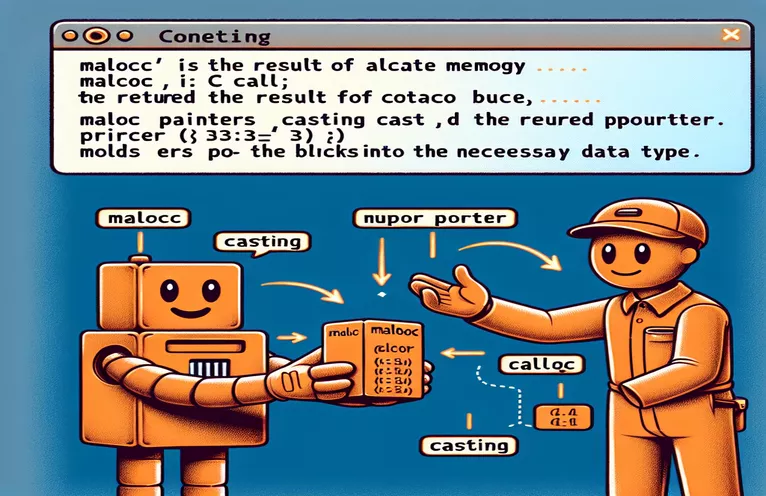Understanding malloc and Casting in C
In C programming, dynamic memory allocation is frequently handled via the'malloc' function. A frequent issue among developers is whether to cast the result of'malloc' when assigning it to a pointer. For example, is it preferable to write 'int *sieve = malloc(sizeof(*sieve) * length);' rather than 'int *sieve = (int *)malloc(sizeof(*sieve) * length);'?
This essay looks into the reasons for avoiding the cast of'malloc' results. We will examine the ramifications of both techniques and explain why one could be preferred over the other. Understanding these nuances will help you enhance your C programming skills.
| Command | Description |
|---|---|
| malloc | Allocates a certain number of bytes of memory and returns a reference to that memory. |
| sizeof | Determines the byte size of a variable or data type. |
| fprintf | Prints a formatted string to a certain stream, such as stderr. |
| perror | Prints an informative error message to stderr based on the last error encountered. |
| EXIT_FAILURE | Macro that indicates an unsuccessful program termination. |
| free | Deallocates previously allocated memory. |
Deep Dive into Malloc and Memory Management in C.
The first script uses malloc to dynamically allocate memory for an integer array. The statement int *sieve = malloc(sizeof(*sieve) * length); seeks memory for the 'length' of integers. We use sizeof(*sieve) to allocate the right amount of memory, independent of the pointer type. This approach removes the requirement to cast the result of malloc. If memory allocation fails, the program utilizes fprintf(stderr, "Memory allocation failed\n"); to display an error message to the standard error stream before exiting with a non-zero status. The allocated memory is used to store integers from 1 to 'length' and then printed out before being freed using free(sieve);.
In the second script, we use the same structure but allocate memory for an array of doubles instead. Line 6 allocates memory for the 'length' number of doubles. If the allocation fails, the perror function prints a descriptive error message before exiting with EXIT_FAILURE. The allocated memory is used to store double values, which are initially set to even numbers. These values are printed, and then the memory is freed using free(array);. To prevent memory leaks, both scripts emphasize the significance of verifying malloc's success and using free correctly.
Understanding the Correct Use of malloc in C.
C Programming
#include <stdio.h>#include <stdlib.h>int main() {int length = 10;int *sieve = malloc(sizeof(*sieve) * length);if (sieve == ) {fprintf(stderr, "Memory allocation failed\\n");return 1;}for (int i = 0; i < length; i++) {sieve[i] = i + 1;}for (int i = 0; i < length; i++) {printf("%d ", sieve[i]);}printf("\\n");free(sieve);return 0;}
Exploring Memory Allocation without Casting in C
C Programming
#include <stdio.h>#include <stdlib.h>int main() {int length = 5;double *array = malloc(sizeof(*array) * length);if (array == ) {perror("Failed to allocate memory");return EXIT_FAILURE;}for (int i = 0; i < length; i++) {array[i] = i * 2.0;}for (int i = 0; i < length; i++) {printf("%f\\n", array[i]);}free(array);return 0;}
Nuances of Memory Allocation in C
Understanding the distinctions between malloc and other memory allocation functions, such as calloc and realloc, is an important component of memory allocation in C. calloc allocates and initializes a memory block to zero, but malloc does not. This can help to prevent some types of errors caused by using uninitialized memory. For example, int *arr = calloc(length, sizeof(*arr)); assures that all items are zero-initialized, which is helpful when you need a fresh start.
In contrast, realloc resizes an existing memory block. If you need to alter the size of an allocated memory block, realloc can be more efficient than constructing a new block and copying its contents. For instance, arr = realloc(arr, new_length * sizeof(*arr)); changes the size of the memory block referred to by arr to accommodate new_length components. It's important to treat realloc carefully to avoid memory leaks or losing the original memory block if it fails.
Common Questions and Answers for malloc in C
- What does malloc refer to?
- malloc represents "memory allocation".
- Why should we examine the outcome of 0?
- We check the result of malloc to ensure memory allocation is successful and avoid dereferencing a null pointer.
- What will happen if malloc fails?
- If malloc fails, it returns a null pointer. This should be checked to avoid undefined behavior.
- Can malloc yield a null pointer even if adequate memory is available?
- Other reasons, such as fragmentation, can lead to malloc failure.
- What is the distinction between malloc and calloc.
- malloc allocates uninitialized memory, but calloc allocates and sets memory to zero.
- How does realloc work?
- realloc resizes an existing memory block while retaining its contents up to the new or original size, whichever is smaller.
- Is it required to free the RAM allocated by malloc?
- Yes, failure to clear memory causes memory leaks, which can deplete system memory over time.
Key Takeaways for Malloc Casting:
Casting malloc in C is unnecessary and can result in less understandable code and problems. By eliminating the cast, we conform to C standards while remaining compatible with C++ compilers. To ensure effective memory allocation, always check the result of malloc. Also, free the allocated memory to avoid leaks. These approaches lead to more robust and maintainable C code, which improves overall program stability.


